Driving commercial and political engagement between Asia, the Middle East and Europe
Driving commercial and political engagement between Asia, the Middle East and Europe
Driving commercial and political engagement between Asia, the Middle East and Europe
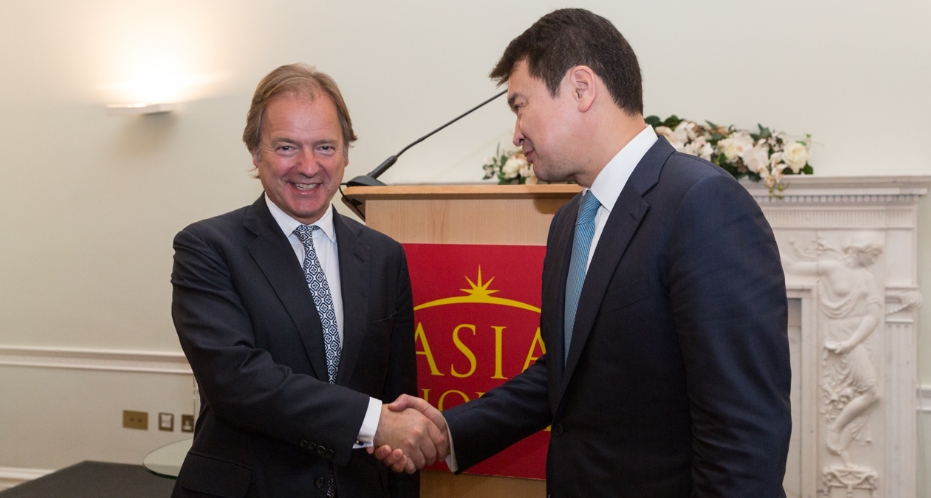
Mongolia is open for business. The country, the second largest landlocked country in the world, is actively seeking foreign investment in infrastructure, roads, railways and power plants, as well as renewable energies, the mining sector, leisure, housing and tourism.
That was the message at the conference ‘Mongolia: Open for International Business’ held at Asia House to discuss new opportunities in the country, at which the Prime Minister of Mongolia, HE Saikhanbileg Chimed, made keynote remarks.
Mr Saikhanbileg, who was elected as Prime Minister in November 2014, was in the UK alongside a delegation of ministers, following a trip to Washington where he met American financial groups and business leaders in a bid to encourage American investors.
The Mongolian Government is seeking foreign investment after reaching a deal with Rio Tinto in May this year allowing the mining giant to restart a long-delayed US$6.2 billion development at Oyu Tolgoi, one of the world’s largest copper deposits in the South Gobi Desert. Plans for an underground expansion of the copper and gold mine, where 80 per cent of the mine’s mineral wealth lies, had been stalled for two years because of legal disputes and disagreements between the Anglo-Australian group and the Mongolian Government over how to split the project’s costs and revenues. The mine is jointly owned by the Government of Mongolia (34 per cent) and Turquoise Hill Resources (66 per cent, of which Rio Tinto owns 51 per cent). Since 2010, Rio Tinto has also been the manager of the Oyu Tolgoi project.
Whilst Mongolia hosts 10 per cent of the world’s known coal reserves and has significant copper deposits, FDI plunged from $US4.45bn in 2012 to $US507.6m in 2014. Growth rates have fallen sharply after being in double digits just a few years ago. Despite a substantial increase in mining output, growth in Mongolia’s GDP slowed to 7.8 per cent in 2014 from 11.6 per cent in 2013, according to the Asian Development Bank. By the time it reaches full production in 2021, the International Monetary Fund estimates that Oyu Tolgoi will generate up to a third of Mongolia’s GDP.
“Mongolia is open for business – not only for Mongolian business but also for UK companies,” Mr Saikhanbileg told the audience of business executives, also packed with international media.
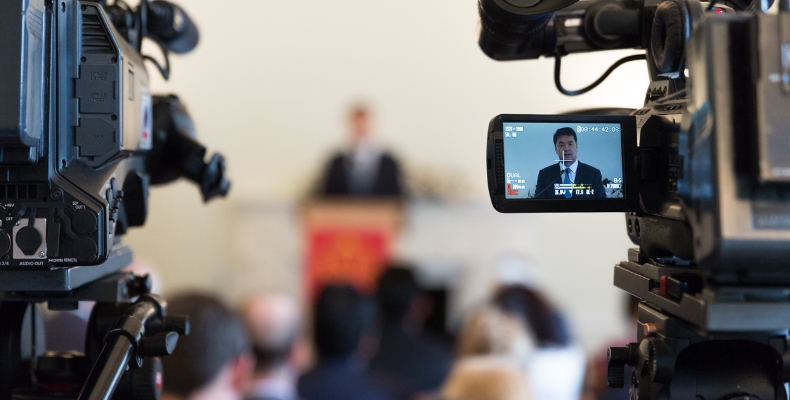
The conference ‘Mongolia: Open for International Business’ held at Asia House attracted international media. Image copyright: Andy Tyler Photography
“We are highly committed to this. Without development and partnerships with foreign companies and investment, there will be no way we can unlock our huge potential. We are totally dedicated to making it happen for any companies present [at this conference]. That’s why we have developed our investment agency, the Invest Mongolia Agency, the chairman of which is also in the UK on this trip,” he said.
He said Mongolia’s blessings were in many ways that it was very rich in natural resources. “We have more than 6,000 mineral deposits and more than 80 different minerals worth more than US$1.3 trillion. We need to unlock them,” he told the packed room.
He said many people thought of Mongolia as a “far away country” but in fact it was the neighbour of the biggest market in the world – China – and a great gateway to that market. “We have almost 3,000 miles of border with China, so that’s why we are a good platform to establish business with the second largest economy in the world China; with Russia [until recently the eighth largest economy in the world]; with Japan, the third largest economy in the world; and with South Korea, the world’s 12th largest economy,” he said.
“We are trying to establish a business-friendly environment in Mongolia and to offer stability,” he explained. “There is no distinction in Mongolia between locals and foreigners. We will do whatever it takes to proceed with the Rio Tinto project which will benefit many people and next week there will be a resolution on the US$5 billion coal mine Tavan Tolgoi (TT),” he said. Investors in the latter project include China’s Shenhua Energy and Japan’s Sumitomo Corp. A railway line linking the mine to China is also planned.
Last week the Mongolian Government signed an MOU with British Gas regarding exporting oil, he said. “This is the beauty of democracy that we have a free market economy,” Mr Saikhanbileg added.
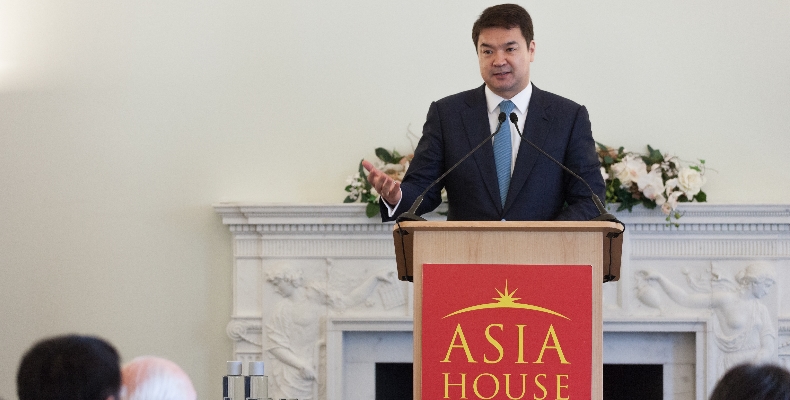
The Prime Minister of Mongolia HE Saikhanbileg Chimed spoke about opportunities in Mongolia for British investors at Asia House. Image copyright: Andy Tyler Photography
The Prime Minister stated that Mongolia, which is celebrating 25 years of democracy this year, “cared about human rights” and would soon be joining the United Nations Human Rights Committee.
“Attention to Mongolia is coming back. Mongolia is back for business and open for business. All of you have the Prime Minister’s invite to come to Mongolia and see the difference and enthusiasm we are trying to create a new society. There are plenty of opportunities,” he added.
GDP growth is forecast to slow to three per cent in 2015 due to falling prices in Mongolia’s main mineral exports and despite rapid growth led by mining in the last few years, around one quarter of the country’s population remains in poverty.
But Mr Saikhanbileg spoke about pending major projects in Mongolia including highways, rail transport, Talvan Tolgoi and power plants, including hydro-electricity power stations.
“There are 100s of SME projects, not big mega projects, and they are not all in the mining sector. All sectors of our economy are waiting for you,” he told the delegates. “This will not only benefit Mongolia but it will benefit your countries as well. We have 400 companies in Mongolia looking for partners in the SME field so we would encourage you to engage with them,” he added. “Our southern neighbour is the biggest consumer in the world and we are in negotiations with the Chinese government to export more energy.”
The Rt Hon Hugo Swire MP, Minister of State at the Foreign and Commonwealth Office, then made a speech about the close ties the UK had with Mongolia and how they were flourishing.
He first spoke about how impressed he was with Mongolia following his last visit just over a year ago referring to the country’s “breath-taking scenery” and also the Oyu Tolgoi mine in the Gobi desert which he said “has enormous potential.”
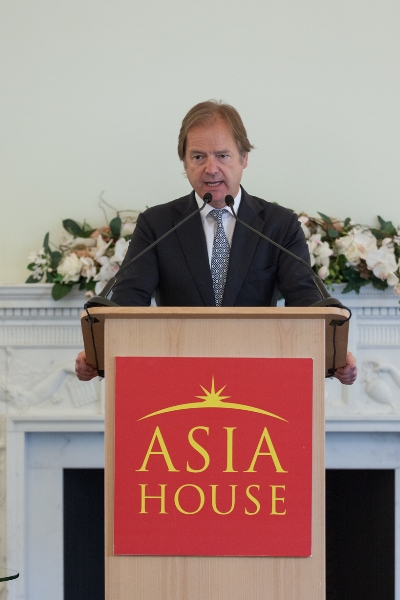
The Rt Hon Hugo Swire MP spoke about the UK’s ties with Mongolia during the conference. Image copyright: Andy Tyler Photography
Mr Saikhanbileg had already met UK Prime Minister David Cameron, UK Trade Minister the Rt Hon Lord Maude of Horsham and UK Foreign Secretary the Rt Hon Philip Hammond MP during this London trip, he said.
“There was huge enthusiasm in the UK Government about the prospects for our relationship,” he said. “Over the last decade, Mongolia’s GDP in purchasing power parity terms per capita has doubled. And it has the potential to become one of the fastest growing economies in the world. To see Mongolia take its place in the global economy will be a great achievement for Mongolia and its people. The UK is very proud to support Mongolia’s economic reforms,” he said, explaining that Mongolia was a trusted partner of the UK. Mongolia is currently implementing ground-breaking planning tools for “sustainable city development” in partnership with British organisation the Ecological Sequestration Trust, he added.
He said Mongolia was a fine “example of managing a peaceful transition from Communism.”
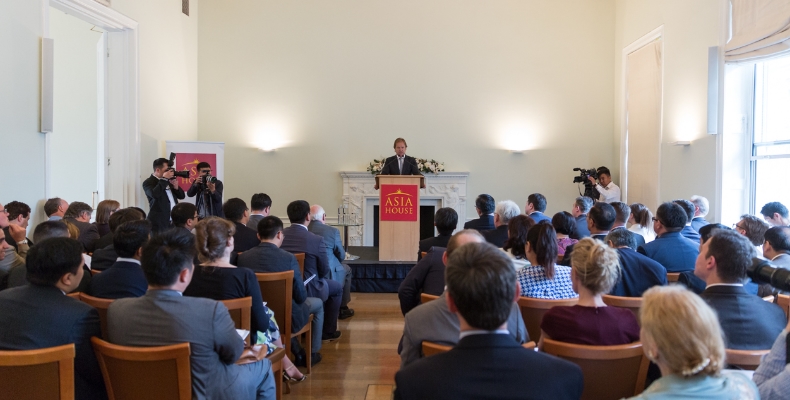
The conference ‘Mongolia: Open for International Business’ held at Asia House was packed. Image copyright: Andy Tyler Photography
“It’s something that many can learn from – Mongolia’s unwavering commitment to democracy. Mongolia is becoming an increasingly attractive partner for trade, investment and cooperation. The mining and minerals sector offers great opportunities,” he said.
He said a strategic partnership between the London Stock Exchange and Mongolian Stock Exchange was already in place and mentioned the Prime Minister of Mongolia had met Lloyd’s of London “to ensure he has the correct investment architecture in place.”
“The most precious resource Mongolia has is its young people so we have deepened our links,” he said, adding the UK wanted to increase the number of Chevening Scholarships awarded to Mongolian students.
“The future for Mongolia looks very bright indeed and as Mongolia moves forward we hope it will continue to see the UK as a trusted friend,” he added.
Jean-Sébastien Jacques, Chief Executive, Copper & Coal group at Rio Tinto, said Asia was one of Rio Tinto’s largest consumer markets, as well as “a key investment and development partner, and a growing source of talent and innovation for Rio Tinto.”
He explained it took on average 27 years for a project to go from discovery to production and a great deal of commitment, co-operation, patience, respect and mutual trust was needed.
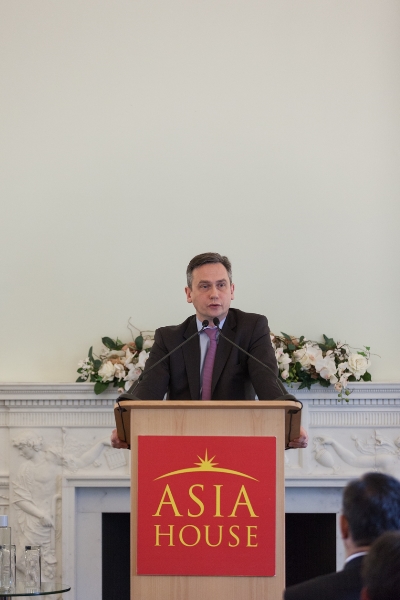
Jean-Sébastien Jacques, chief executive, Copper & Coal at Rio Tinto, made a speech at the conference.
He said Mongolia had “for centuries sat in the shadows of its two giant neighbours” but now its extensive mineral wealth, its young population and committed passionate workforce,” its “perfect positioning to supply and access the markets that will dominate the 21st Century” and its “willingness to reach beyond its borders” made it an “exciting and promising place to invest.”
“It does not matter where we operate in the world. You will see the same standards in terms of the environment across the world,” Mr Jacques said. “We believe our developments are sustainable,” he added, explaining that since 2010, Rio Tinto’s in-country spend in Mongolia was US$4.8 billion, meaning taxes for the government to spend on health and education, wages for families and opportunities for hundreds of Mongolian suppliers.
Oyu Tolgoi is one of the most significant copper and gold developments in the world. Estimates indicate that Oyu Tolgoi contains 2.7 million tonnes of recoverable copper and 1.7 million ounces of recoverable gold in reserves.
Copper is an increasingly important mineral which is used in everyday life, he said, mentioning iPhones, cars, power generation and houses. He said the fact it could be infinitely recycled made it especially valuable.
“Due to falling copper grades and many mines reaching the end of their lives, the world faces an annual four to six million tonne copper production deficit within the next decade. That’s why a world-class asset like Oyu Tolgoi, which will run for many generations, is so important. It provides an opportunity to plan for the long term,” he said.
He admitted that along the way Rio Tinto had “faced some challenges” but that Rio Tinto “never doubted the long-term vision of partnering with Mongolia.” “I would like to compliment Prime Minister Saikhanbileg for his courage and leadership,” he added.
“Stability and the rule of law are critical for investors like us,” he said, commending the Prime Minister for his commitment to them. He added the relationships and partnerships required for the large-scale development would build capacity and “aim to foster transparency.” “Mongolia is very much open for business,” he concluded.
Before the conference an MoU was signed between the Mongolian Government’s Invest Mongolia Agency (IMA) and Asia House agreeing to work together to encourage British direct investment in Mongolia. The MoU states that the IMA will provide Asia House with information on business opportunities in Mongolia and potential projects and that Asia House will assist the IMA in identifying appropriate projects and potential British investors and providing those investors with information on the opportunities.
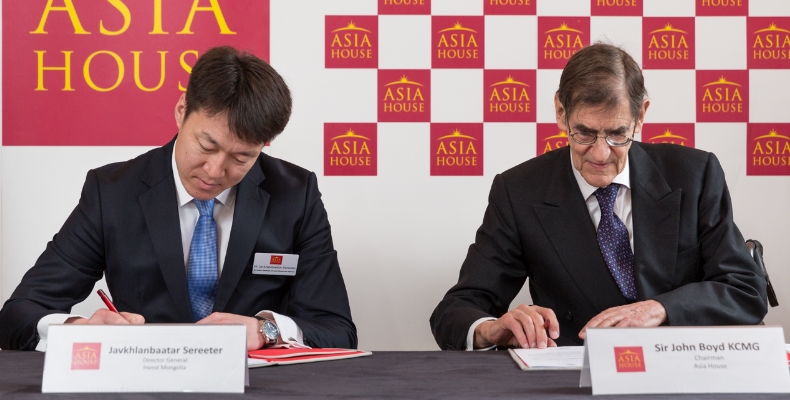
Javkhlanbaatar Sereeter, Director General, Invest Mongolia, left, and Sir John Boyd KCMG, chairman, Asia House, right, sign the MoU between the two organisations at Asia House in London. Image copyright: Andy Tyler Photography
In the morning HE Saikhanbileg Chimed gave a private briefing to Asia House corporate members. Topics discussed included Mongolia’s growth rates and economic development, corruption, the country’s infrastructure, exports, power plant projects, mining, tourism and financial services.
Companies represented at the table included Rio Tinto, Amec Foster Wheeler, PwC and Standard Chartered.
naomi.canton@asiahouse.co.uk
To find out more about the benefits of corporate membership of Asia House click here.
Asia House is hosting a conference on Tuesday 14 July to examine the future infrastructure demands in Asia as well as strategies and partnerships to maximise the wealth of opportunities in the region. To find out more click here.
